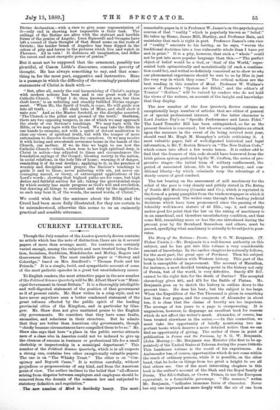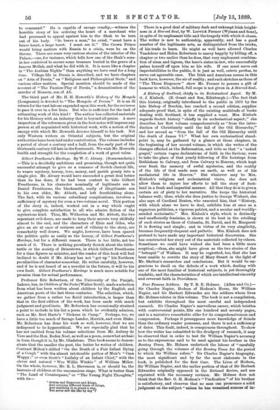The Story of the Nations : Persia. By S. G.
W. Benjamin. (T. Fisher Unwin.)—Mr. Benjamin is a well-known authority on this subject, and he has put into this volume a very considerable amount of knowledge. In the earlier chapters he naturally follows, for the most part, the great epic of Ferdausi. Then his subject brings him into relation with Western history. This part of the book is susceptible of improvement. The account of Marathon, for instance, a most decided turning-point in the history not only of Persia, but of the world, is very defective. Surely 479 B.C. cannot be the right date for the death of Darius ? The accepted chronology gives 485, and 479 for the Battle of Plataa. Mr. Benjamin goes on to sketch the history in outline down to the present time. He does his best; but the subject is too large. When the Expedition of the Ten Thousand is given in something less than four pages, and the conquests of Alexander in about ten, it is clear that the claims of brevity are too imperious.
The average of ten years to a page is overpowering. It is ungracious, however, to disparage an excellent book for reasons which do not affect the writer's merit. Alexander, of course, has been treated elsewhere in the series.—In this connection, we must take the opportunity of briefly mentioning two im-
portant books which deserve a more detailed notice than we can find an opportunity of giving. The earlier of these in point of publication is Persia and the Persians, by S. G. W. Benjamin.
(John Murray.)—Mr. Benjamin was Minister (the first to be ap-
pointed) of the United States at Teheran during the years 1883-85. This handsome volume is the result of his experiences. An
Ambassador has, of course, opportunities which do not come within the reach of ordinary persons, while it is possible, on the other hand, that he looks on things from too great a height to see all
that others see. One of the most interesting chapters in this book is the author's account of the Shah and the Royal family of Persia. The Zi1-11-8ultan, or Crown Prince, to use the European equivalent, is a formidable personage. "His manner," writes
Mr. Benjamin, "indicates immense force of character. Never has any one impressed me more deeply with the air of one born to command." He is capable of savage cruelty,—witness the horrible story of his ordering the heart of a merchant who had presumed to appeal against him to the Shah to be torn out of his body. "So brave a man," he cried, "must have a brave heart, a large heart. I must see it." The Crown Prince would bring matters with Russia to a crisis, were he on the throne. There are some very curious stories of the interior of the Palace,—one, for instance, which tells how one of the Shah's sons- in-law contrived to secure some treasure buried in the grave of a famous Mollah, and what he did with it. It is more like a chapter in "The Arabian Nights" than anything we have read for a long time. Village life in Persia in described, and we have chapters on "Arts of Persia," on "Religious and Philosophical Sects," and various other matters. Special mention should be made of the account of "The Passion-Play of Persia," a dramatisation of the murder of Hosseln, son of Ali.



































 Previous page
Previous page